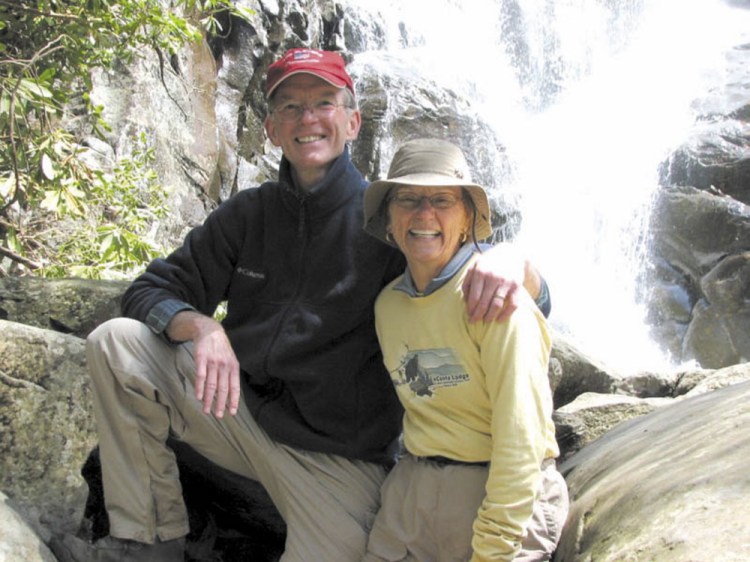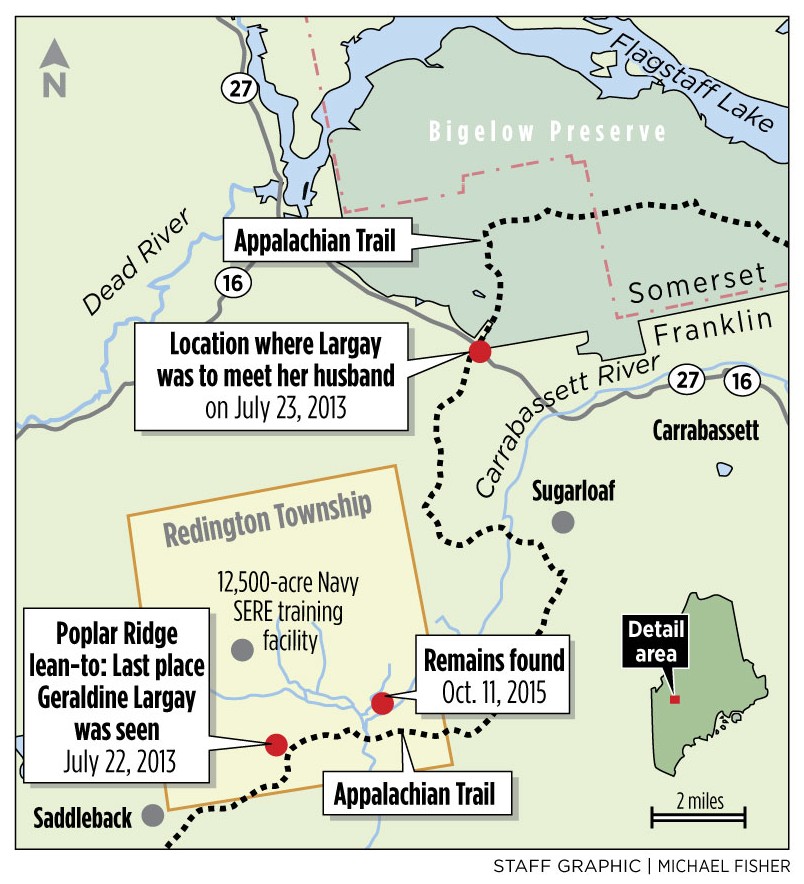The family of Geraldine Largay, who died in the summer of 2013 after becoming lost while hiking the Appalachian Trail in western Maine, has issued a public statement saying she was strong, brave and resourceful and praising the Maine Warden Service and volunteers who searched for her.
A warden service report released Wednesday, however, indicates she might have been unprepared for the hike, had a poor sense of direction, was afraid of the dark and didn’t know how to use a compass.
“Gerry was doing exactly what she wanted to do,” the family said in the statement released Friday. “She’d hiked a thousand miles — after 200 miles of training hikes the year prior — and as the warden’s report indicates, she was lucid and thinking of others, as always, until the very end.”
The remains of Largay, 66, of Tennessee, were found last fall — more than two years after she disappeared — at a campsite she had set up in Redington Township, about 3,000 feet from the trail. The Maine Warden Service on Wednesday released its 1,579-page file detailing findings in the case that includes a journal Largay kept during her ordeal. The warden file also reveals that Largay tried unsuccessfully to text her husband George for help, that she survived a few weeks in the woods after establishing a campsite, and that she didn’t know how to use a compass.
A Boston Globe story dated Friday says the Largay family statement released Friday through spokesman David Fox challenges “‘characterizations made by the media that she was unprepared and possibly suffering from an anxiety disorder.'”
The statement released to Morning Sentinel does not contain that quotation, however.
It says Largay was a “positive, vibrant, optimistic, enthusiastic and spiritual person.”
“We miss her every day. She was, and still is, a beacon of light for her family and everyone who knew her, and her final days were a testament to her bravery, resourcefulness and her faith.”
A call placed Saturday to Fox’s cellphone was not returned. Fox is a partner in McNeely, Pigott & Fox Public Relations in Nashville, Tennessee.
The family statement says that like Largay herself, the family is “strong and resilient and guided by our faith.”
“While we grieve for Gerry, we do not second-guess any of the efforts to find her when she went missing. We witnessed firsthand the passion and commitment of the hundreds of game wardens and volunteers who searched for her. And having hiked into the site where she died, we know how hard it would have been to find her.”
Largay’s Aug. 6, 2013, journal entry says, “When you find my body, please call my husband George and my daughter Kerry,” according to the warden report. “It will be the greatest kindness for them to know that I am dead and where you found me — no matter how many years from now. Please find it in your heart to mail the contents of this bag to one of them.”
In the summer of 2013, Largay was hiking the 2,184-mile Appalachian Trail, which starts at Springer Mountain, Georgia, and ends at Mount Katahdin. She began the hike in West Virginia, with Jane Lee, a friend and nurse, who had to leave once they completed the New Hampshire part of the trail.
Largay had less than 200 miles to go on the 950-mile hike when she disappeared.
A forester working for the U.S. Navy discovered Largay’s campsite and remains Oct. 11 last year on restricted Navy land used for survival training.
According to the warden report, Lee told officials about multiple occasions when she had to backtrack on the trail to find Largay, as Largay had either become lost or fallen behind. Largay once relied on another hiker to get her headed in the right direction, according to interviews described in the warden file.
A compass was found in Largay’s belongings, but the warden report says that according to Lee, Largay did not know how to use it.
The report also says Largay’s doctor had expressed concern she may not have been taking a prescribed anti-anxiety medication.
Lee described Largay as afraid of the dark and scared of being alone and that she was certain Largay’s husband was not aware of her struggles. Largay’s husband told the warden service that “Gerry was probably in over her head, trying to go the hike,” according to the warden service report.
Meanwhile, the family statement encourages people to make contributions to two causes that would mean the most to her, the Maine Association for Search and Rescue and the Nature Conservancy, as a way to have her memory live on.
“Gerry inspired everyone she came in contact with, and our purpose in sharing these comments is to honor her legacy.”
The warden service did not immediately return a message left Saturday, and a public safety dispatcher said officials might not be able to return a call until Tuesday, as it is a holiday weekend.
Amy Calder — 861-9247
Twitter: @AmyCalder17
Copy the Story LinkSend questions/comments to the editors.





Success. Please wait for the page to reload. If the page does not reload within 5 seconds, please refresh the page.
Enter your email and password to access comments.
Hi, to comment on stories you must . This profile is in addition to your subscription and website login.
Already have a commenting profile? .
Invalid username/password.
Please check your email to confirm and complete your registration.
Only subscribers are eligible to post comments. Please subscribe or login first for digital access. Here’s why.
Use the form below to reset your password. When you've submitted your account email, we will send an email with a reset code.